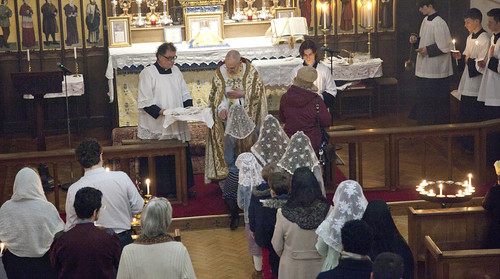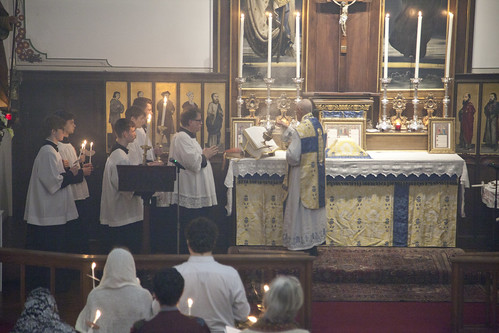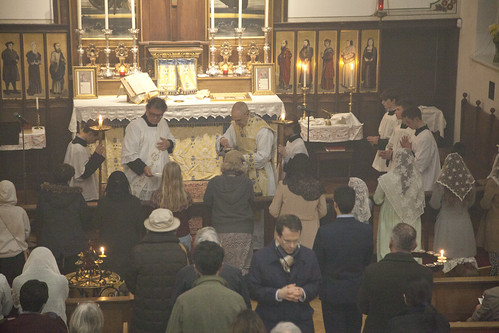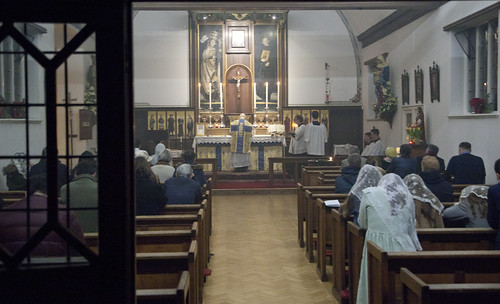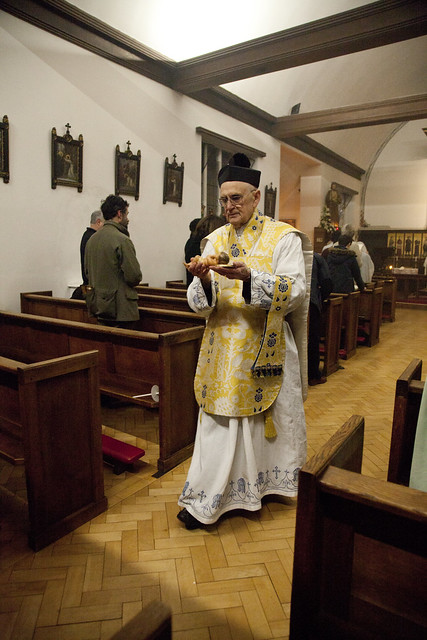Chairman's Blog
Pray for the TLM this Lent
Appeal for prayers and penances
for the Liberty of the Traditional Mass in Lent
From Una Voce International and others
Una Voce International and other organisations, groups and individuals concerned with the Traditional Latin Mass would like to appeal to all Catholics of good will to offer prayers and penances during the season of Lent, particularly for the intention: the liberty of the Traditional Mass.
We do not know how credible rumours of further documents from the Holy See on this subject may be, but the rumours themselves point to a situation of doubt, conflict, and apprehension, which is severely harmful to the mission of the Church. We appeal to our Lord, through His Blessed Mother, to restore to all Catholics the right and opportunity to worship according to the Church’s own venerable liturgical traditions, in perfect unity with the Holy Father and the bishops of the whole Church.
Una Voce International (Foederatio Internationalis Una Voce, FIUV,) https://fiuv.org
Other language versions: French
Appel à la prière et à la pénitence durant le Temps du Carême pour la liberté de la messe traditionnelle.
La Fédération International Una Voce (FIUV) et d'autres organisations, groupes et individus concernés par la messe traditionnelle en latin lancent un appel à tous les catholiques de bonne volonté pour qu'ils offrent des prières et des pénitences pendant le Temps du Carême, à l'intention de la liberté de la messe traditionnelle.
Nous ne savons pas à quel point les rumeurs concernant d'autres documents du Saint-Siège à ce sujet peuvent être crédibles, mais les rumeurs elles-mêmes indiquent une situation de doute, de conflit et d'appréhension, qui nuit gravement à la mission de l'Église. Nous appelons Notre-Seigneur, par l'intermédiaire de sa Sainte Mère, à rendre à tous les catholiques le droit et la possibilité de pratiquer le culte selon les vénérables traditions liturgiques de l'Église, en parfaite unité avec le Saint-Père et les évêques de toute l'Église.
Fédération Internationale Una Voce (Fœderatio Internationalis Una Voce - FIUV) https://fiuv.org
Italian
Appello per preghiere e penitenze durante la Quaresima per la libertà della Messa tradizionale
Da parte di Una Voce Internazionale
Una Voce Internazionale e altre organizzazioni, gruppi e singole persone che hanno a cuore la Messa latina tradizionale desiderano fare appello a tutti i cattolici di buona volontà affinché offrano preghiere e penitenze durante il tempo di Quaresima, con la seguente speciale intenzione: La libertà della Messa tradizionale.
Non siamo a conoscenza di quanto siano credibili le voci su nuovi documenti della Santa Sede in proposito, ma l’esistenza di quelle voci segnala una situazione di dubbio, conflitto, apprensione, che è gravemente dannosa per la missione della Chiesa.
Invochiamo Nostro Signore, attraverso la sua Beata Madre, affinché renda a tutti i cattolici il diritto e la possibilità di adorare Iddio secondo le venerabili tradizioni liturgiche della Chiesa, in perfetta unità con il Santo Padre e i vescovi di tutta la Chiesa.
Una Voce Internazionale (Foederatio Internationalis Una Voce, FIUV) https://fiuv.org
Spanish
Petición de oraciones y penitencias en Cuaresma por la libertad de la Misa Tradicional
Una Voce International, junto a otras organizaciones, grupos e individuos fieles de la Misa tradicional hacen una llamada a todos los católicos de buena voluntad para que ofrezcan oraciones y penitencias durante el tiempo de Cuaresma, en particular por una intención: la libertad de la Misa tradicional.
German
Una Voce International und andere Organisationen, Gruppen und Einzelpersonen, denen der traditionelle lateinische Ritus wichtig ist, rufen alle Katholiken guten Willens dazu auf, während der Fastenzeit Gebete und Bußübungen zu verrichten, mit dem besonderen Anliegen: für die Freiheit der traditionellen Messe.
Wir wissen nicht, wie zutreffend die Gerüchte bezüglich weiterer Dokumente des Heiligen Stuhls zu diesem Thema sind, aber die Gerüchte selbst deuten auf eine Situation des Zweifels, des Konflikts und der Besorgnis hin, die für die Sendung der Kirche sehr schädlich ist. Wir bitten unseren Herrn durch seine heilige Mutter, allen Katholiken das Recht und die Möglichkeit wiederzugeben, Gott nach den ureigenen ehrwürdigen liturgischen Traditionen der Kirche in vollkommener Einheit mit dem Heiligen Vater und den Bischöfen der ganzen Kirche zu verehren.
Una Voce International (Foederatio Internationalis Una Voce, FIUV), https://fiuv.org
Book Launch 9th March London Oratory: The Liturgy, the Family, and the Crisis of Modernity
Candlemas in Oxford
Servers' responses videos launched
The Latin Mass Society is pleased to present this set of short videos giving the texts with which those learning to serve the Traditional Mass need to familiarise themselves, setting the written text alongside an audio recording. This is presented in the context of the Latin Mass Society's sodality for Altar Servers, the Society of St Tarcisius.
Online Latin Course sponsored for clergy and seminarians
It is good to see Latin Courses focused on the Church's Latin springing up in different places. This one is online and can be done from anywhere. The Latin Mass Society is offering an 80% subsidy for clergy and seminarians from England and Wales to do it; in other places it could be regarded as a parish expense, or other local groups might like to consider helping their priests meet the cost. After all, Catholic priests are supposed to know Latin, not only for the liturgy, but for their understanding of theology and canon law.
12 Week Online Course in Latin Rubrics of the (1962) Mass starts this February and March
For the first time ever the Latin Mass Society are offering a new 12-week language course on the Latin rubrics of the Traditional Latin Mass. This course offered by leading Latin Scholars Matthew Spence and Peter Day-Milne has an exclusive discount available for clergy and early booking discounts available for non-clergy.
Say the Black, Do the Red
In the Apostolic Document Traditionis Custodes it states that priests who wish to celebrate the Traditional Mass should “possess a knowledge of the Latin language sufficient for a thorough comprehension of the rubrics and liturgical texts.”
Do you struggle with comprehending the rubrics?
Do you need help with Latin grammar?
This course available for both clergy and lay people will begin with a detailed look at Latin grammar. There are then two options in the second half of the course to specialise in The rubrics of the Latin Mass (1962) or Reading the Roman Canon
The rubrics of the Latin Mass (1962).This module addresses the difficulty some priests and sacred liturgy ministers often express when they reach certain moments in the Liturgy that they are caught between knowing in principle what the next rubric says and the Latin which is not perfectly clear to them. You will learn how to linguistically interpret certain rubrics, in a supportive group atmosphere.
Reading the Roman Canon This module builds on the elementary grammar you have already learned — so that you may get to grips with this ancient liturgical text that remains the solemn basis of a key part of the liturgy in all western Catholic rites, not only in Latin but in vernacular celebrations.
The total fee for a 12 week online course is £650 but If you sign up NOW an early bird discount of 10% is available. If you are a priest based in, or hailing from England & Wales, an 80% discount is available on the course fee.
For further information on this or other Latin courses available during the year contact For the course director Matthew Spencer Email : matthewjaspencer@yahoo.com
Further details CLICK HERE
Iota Unum dates for 2023
 |
| Prof Pink giving a talk on a previous occasion. |
We are delighted to announce dates for the spring and summer.
Talks take place in the basement room at Our Lady of the Assumption Warwick Steet. Please enter it from the Golden Square side:
24 Golden Square, London, W1F 9JR
24th Feb Dr Caroline Farey
24th March Dr Sebastian Morello ‘Technocracy and the Process of Un-Personing’
29th April James Bogle
19th May Dr Joseph Shaw 'Clericalism and Clerical Abuse'
30th June Prof Thomas Pink 'Religion and Human Nature'
Doors open at 6:30pm, talk starts at 7pm. Refreshments provided. £5 on the door.
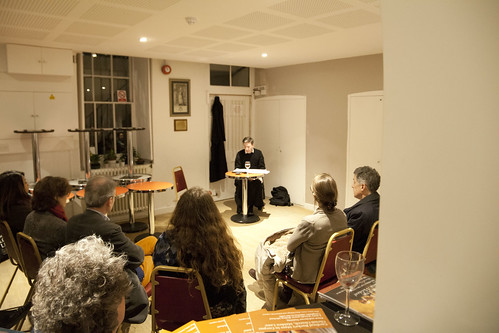 |
| Fr Edward van den Burgh giving a talk. |
The problem of religious traditionalists
New Patrons for the Latin Mass Society
 |
| Official portrait of Sir Edward Leigh, By Chris McAndrew, via Wikipedia Commons |
Press Release from the LMS
The Latin Mass Society is delighted to announce two new Patrons: Sir Edward Leigh MP, and John Smeaton, former Chief Executive of the Society for the Protection of Unborn Children.
Sir Edward Leigh has sat as a Member of Parliament for Gainsborough since 1983. He is among the most respected Catholic members of Parliament, and has served as a Secretary of State and held many important roles in Parliamentary committees. He was knighted in 2013, is an Officer of the Légion d’honneur of France, and a Commander of the Order of the Star of Italy.
John Smeaton was Chief Executive of the Society for the Protection of Unborn Children (SPUC) from 1996 to 2021, and is the foremost pro-life campaigner in Britain. In 2013, he received the Cardinal John J. O’Connor Pro-Life Award from Legatus, an international organization of Catholic business leaders; and in 2015, he received the first Fr Paul Marx Award from Human Life International. He now leads Voice of the Family, which was founded in 2014 to defend Catholic teaching on the family, and publishes Calx Mariae magazine.
Sir Edward Leigh in response to the appointment said: ‘Through its work preserving and expanding access to the full richness of the Latin liturgy, the Latin Mass Society of England & Wales has proved to be one of the most beneficially influential bodies in the history of the post-conciliar Church.’
John Smeaton commented: ‘It is a great privilege to be invited to be asked to become a Patron of the Latin Mass Society whose distinguished service to the Church in England and Wales has so immeasurably benefited the Catholic community, including my family, for almost 60 years.’
Welcoming them, Joseph Shaw, Chairman of the Latin Mass Society, said: ‘I am delighted that Sir Edward and John Smeaton have agreed to become Patrons of the Society. Each in his own sphere represents the best of lay Catholic leadership in this country, playing key roles in public life over many decades with courage, perseverance, and faith. They join an already very distinguished group of Patrons, who have kindly associated themselves with the Society and its work for the traditional Latin Mass.’
Sir Edward and Mr Smeaton join five other Patrons of the the Latin Mass Society:
Prince Rupert Löwenstein and Colin Mawby KSG, the composer, were Patrons of the Society until their deaths in 2014 and 2019 respectively.
For more about our Patrons see the LMS website HERE
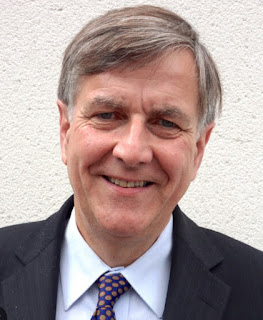 |
| John Smeaton (image via 1Peter5) |
Vacancy for a General Manager at the LMS
The Latin Mass Society has a permanent office in London and a small paid staff: two full-time, one part-time, plus two freelancers. Our senior member of staff, the General Manager, holds a full-time position with important responsibilities, for the Society's major events, its online shop, and a lot of other things. Our current GM, Stephen Moseling, has been with us for about six years, and having reached pensionable age he is retiring. It has been a pleasure for me to work for him, and the Society has benefitted enormously from him experience and dedication. Our online shop, most obviously, is very much his creation, and has grown enormously over the last few years. Stephen has most recenty overseen a painless move of office, to a larger space.
From the LMS website.
Our present General Manager, Stephen Moseling, will reach retirement age this year and has taken the decision to retire at the end of March, therefore we are looking for a replacement.
The purpose of the role is to support the work of the Society’s volunteer activists, manage an office with a small staff, online shop, and website, and to be the first point of contact for many enquiries to the Society.
Reporting Lines
The General Manager reports to the Committee of the Society under the Terms of the Constitution, but will deal directly with the Chairman, Secretary and Treasurer on a day-to-day basis to ensure the efficient administration and development of the Society.
The Society's Bookkeeper and IT specialist, Office Assistant, the Editor of the Society’s magazine Mass of Ages, and the Communications Officer, report to the General Manager.
Responsibilities
1. To manage the operations of the Office on a day-to-day basis: to supervise the employees of the Society; to make recommendations for the recruitment of replacement or additional staff, to ensure that the work of the Society’s office is carried out efficiently and to report any difficulties to the Officers and Committee; to keep a record of staff attendance and punctuality.
2. To co-ordinate or assist in the organisation of flagship events including training events, retreats, important Masses and Pilgrimages, the Annual General Meeting, and the production of the annual Accounts.
3. To support the Society’s network of Local Representatives.
4. To make recommendations to the Committee, particularly concerning development, the generation of increased publicity, membership and income, and the timely control of expenditure.
5. To attend Committee meetings and other meetings, including with outside bodies, as required by the Committee, and to produce reports and minutes for these meetings.
6. To oversee the production of the Society’s quarterly magazine, Mass of Ages.
7. To fulfil such other activities as may reasonably be from time-to-time required.
The ideal candidate will demonstrate:
- Experience of managing an office
- Experience of book selling to a Catholic market
- Experience of event planning
- Experience of working under pressure
- Experience of working independently and in a small team
- Excellent interpersonal skills
- A good knowledge and understanding of the UK and international Catholic environment and the Traditional Latin Mass
Salary: £45,000 per annum
Application by CV and covering letter (hard copy or email) to Stephen Moseling, General Manager, The Latin Mass Society, 9 Mallow Street, London EC1Y 8RQ
stephen@lms.org.uk
Closing date for applications: Tuesday, 31st January 2023. Interviews will take place in London on Thursday, 9th February 2023.
The Job Specification can be downloaded HERE.
Farewell, Pope Benedict: official statement of the LMS
 |
| From Wikipedia Commons. |
Statement on the death of Pope Benedict XVI
The Latin Mass Society learns with deep sorrow of the death of the Pontiff Emeritus, Benedict XVI, Joseph Ratzinger.
As a theologian, as Prefect of the Congregation for the Doctrine of the Faith, and as Pope, he made an outstanding contribution to the life of the Church, in ways which will continue to be felt far into the future.
Catholics attached to the Traditional Mass have a particular motive for gratitude towards him. In his writings before his election as Pope he laid indispensable foundations for the rehabilitation of the Church’s ancient Mass, which had been banished to a precarious existence on the periphery of the Church’s life, its supporters treated—as he himself expressed it—like ‘lepers’. As Pope, his Apostolic Letter Summorum Pontificum, which declared that the older Missal has never been abrogated, transformed attitudes towards it, and brought it back into the heart of the Church. For a generation of priests and laity, Pope Benedict’s action remains the decisive influence on how they see the question.
Pope Benedict’s public actions reflected a great sensitivity to the liturgy, a comprehensive mastery of theology, and an intellectual honesty and courage based on profound humility.
The Latin Mass Society will be organising a Requiem of suitable solemnity for Pope Benedict in due course.
Requiem æternam dona eis, Domine, et lux perpetua luceat eis.





.jpg)

